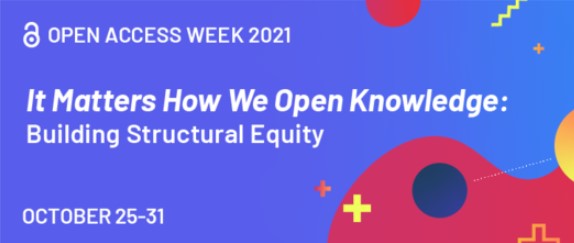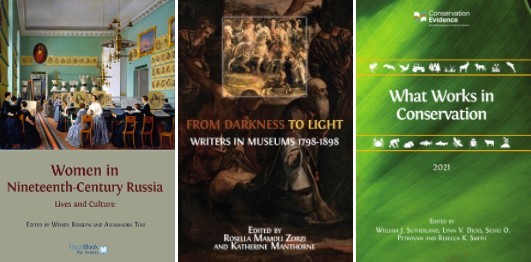
October 28, 2021, by Sarah
Discover our collections: Open Access Books
Academic monographs continue to play an important role in the humanities and social sciences. For International Open Access Week 2021, we’re taking a look at publishing monographs open access.
UK Research and Innovation recently announced a new Open Access policy. This includes a new requirement for monographs, book chapters and edited collections published from 1 January 2024 to be made open access within 12 months of publication.
The open access book publishing landscape
Journal publishers Open Access (OA) Article Processing Charges vary considerably, from nothing to thousands of pounds. Compared to journal articles, managing the transition to OA publishing for monographs is more challenging. To better understand the challenges, this 2019 report produced by the Universities UK Open Access Monographs working group reflects on the group’s findings over the previous 12 months, drawing on a quantitative analysis of the academic book publishing landscape.
In the OA monograph market, consortial, institutional, and other funding systems are emerging, providing an alternative to Book Processing Charges business models. The COPIM (Community-led Open Publication Infrastructures for Monographs) international partnership of researchers, universities, librarians, open access book publishers and infrastructure providers is currently working on seven interconnected work packages to enable more diverse, scholar-led academic publishing. JISC (a COPIM partner) is also developing guidance for libraries.
At Nottingham, we’re following developments with existing and emerging initiatives to gauge where best to direct our support using existing library book funds and data about potential use of titles by University of Nottingham staff and students.
Our support for open access books
University of Nottingham Libraries has supported open access book publishing initiatives for more than seven years. We are members of the Open Book Publishers scheme, have invested in the Open Research Library platform, and have ‘pledged’ to support several rounds of Knowledge Unlatched.
Open Book Publishers (OBP) is a not-for-profit Social Enterprise run by academics. To date, OBP has published 229 ‘born open access’ titles with no Book Processing Charges for authors. Titles are accessed freely worldwide by over 20,000 readers each month. OBP are also part of COPIM, working to develop and strengthen open access book publishing.

OBP titles with a University of Nottingham editor, contributor or expert assessor
Knowledge Unlatched (KU) helps publishers acquire funding for their Open Access titles, using an institutional crowdfunding model to ‘unlatch’ collections. The collections are books that will still be published traditionally (the frontlist) or indeed already have been (the backlist). If the target amount to unlatch the collection is reached, titles are open access to all. If the level of support needed to unlatch all of the content falls short of the target, some titles may be dropped from the collection. To date, more than 3,000 books from more than 150 publishers have been made available on the Open Research Library.

Top five titles by institutional interactions on the Knowledge Unlatched platform
Open access book usage
Research has shown that on average OA books have 10 times more downloads than non-OA books and 2.4 times more citations, increasing and diversifying the readership of scholarly books. Worldwide usage and growth of downloads is similarly shown in the OAPEN 2020 Stakeholder report.
At Nottingham, access to our library subscriptions is controlled via institutional login points. OA books, on the other hand, can be accessed via multiple routes and are freely available both on and off-campus. This makes it very difficult to accurately collect and collate the institutional usage of OA books. Any data we obtain usually doesn’t reflect the full, true usage of titles we’ve supported.
Discoverability
OA books are available across many different platforms globally. To increase discoverability of OA books so that titles reach a broader audience, the Directory of Open Access Books (DOAB) indexes and provides access to (at the time of writing) 44,529 academic peer-reviewed books from 667 publishers.
The DOAB collection is just one of the OA book collections that UoN Libraries has activated for discovery in NUsearch, others include OAPEN, JSTOR, Project Muse and a number of reputable academic presses. We want to offer staff and students a wide range of content to support their teaching, learning and research.
Open Access books and, more generally Open Educational Resources (OER) are one possible alternative to commercial eTextbooks, which are often unaffordable for Libraries and a current topic of debate.
Thinking about publishing your next book as open access?
There are several options to help authors make an informed choice. The Research Support team within University of Nottingham Libraries provide advice on all aspects of open access publishing.
You should talk to your publisher if you’d like to transition your existing book publications to OA. If you’d like to publish with OBP, you can find out more on their information for new authors page. In addition, OAPEN have created a toolkit that aims to help authors better understand open access book publishing. The toolkit includes articles on open access book publishing from planning and funding to publication and reuse.
Finally, if you want to join the debate, you can discuss any aspect of OA books on the Open Access Books Network (some of you are already members!) Here you’ll also find micro-communities designed to facilitate interaction and collaboration between scholars with common interests.
No comments yet, fill out a comment to be the first


Leave a Reply